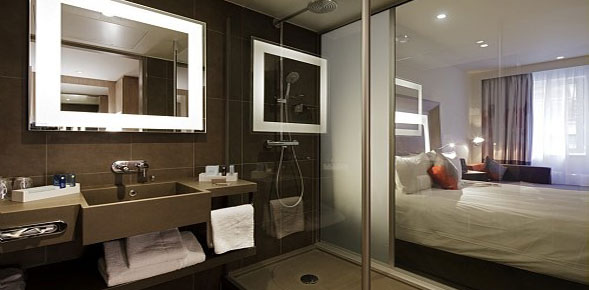STR analysts note that the devaluation of the pound continues to drive inbound travel and stronger domestic tourism in the U.K. In North Africa, STR analysts point to Tunisia as another example of significant occupancy growth due to a low comparison level from the previous year.
LONDON – The hotel industry in Europe reported positive results in the three key performance metrics during the second quarter of 2017, according to data from STR.
Countries of focus: Germany, Netherlands and United Kingdom
Euro constant currency, Q2 2017 vs. Q2 2016
Europe
- Occupancy: +2.1% to 75.1%
- Average daily rate (ADR): +4.4% to EUR114.10
- Revenue per available room (RevPAR): +6.5% to EUR85.67
- Local currency, Q2 2017 vs. Q2 2016
Germany
- Occupancy: -0.8% to 73.8%
- ADR: -0.4% to EUR101.24
- RevPAR: -1.1% to EUR74.76
Supply growth (+1.1%) played a role in the overall performance decrease for the country, reaching 1% for the first time since Q4 2014. Despite the performance at the national level, Q2 RevPAR growth was strong in Cologne (+14.9%) and Hamburg (+14.5%). Performance in Cologne was due to large events such as Art Cologne (April) and the IIHF Ice Hockey World Championship (May). Hamburg’s levels received a lift ahead of the G20 summit in early July.
Netherlands
- Occupancy: +3.9% to 79.5%
- ADR: +6.0% to EUR129.19
- RevPAR: +10.1% to EUR102.72
The absolute occupancy level was the highest for a Q2 in the Netherlands since 2006. Performance growth was especially pronounced in April (RevPAR: +14.2%). At the market level, Amsterdam reported double-digit RevPAR growth (+10.5%) for the quarter, due primarily to a 7.5% lift in ADR to EUR164.91.
United Kingdom
- Occupancy: +1.0% to 79.6%
- ADR: +5.2% to GBP94.22
- RevPAR: +6.3% to GBP75.05
STR analysts note that the devaluation of the pound continues to drive inbound travel and stronger domestic tourism in the U.K. At the market level, London recorded an 8.4% rise in RevPAR to GBP127.33, due primarily to a 6.4% increase in ADR to GBP152.70. The market saw only moderate declines in occupancy following the 3 June terrorist attack at London Bridge. Performance growth soon returned and was boosted around Eid Mubarak as London typically welcomes a high volume of visitors from the Middle East during the holiday. Q2 performance growth for Regional U.K. was lower (RevPAR: +4.8%).
Middle East and Africa
The hotel industry in the Middle East reported nearly flat results during the second quarter of 2017, while hotels in Africa recorded growth across the three key performance metrics, according to data from STR.
U.S. dollar constant currency, Q2 2017 vs. Q2 2016
Middle East
- Occupancy: -0.1% to 62.4%
- Average daily rate (ADR): +0.8% to US$169.67
- Revenue per available room (RevPAR): +0.6% to US$105.84
Africa
- Occupancy: +2.7% to 53.3%
- Average daily rate (ADR): +10.5% to US$101.20
- Revenue per available room (RevPAR): +13.5% to US$53.96
- Local currency, Q2 2017 vs. Q2 2016
Egypt
- Occupancy: +13.9% to 46.8%
- ADR: +67.2% to EGP1,217.52
- RevPAR: +90.5% to EGP569.54
The country’s occupancy growth was due primarily to a comparison with a significantly low performance period during Q2 2016 (41.1%). Occupancy levels last year were greatly affected by the May 2016 EgyptAir plane crash and ensuing security concerns. Since the end of 2016, the country has shown signs of recovery with double-digit occupancy increases in six of seven months. According to STR analysts, the spike in the country’s ADR is consistent with high inflation levels.
Oman
- Occupancy: +10.1% to 49.6%
- ADR: +2.6% to OMR58.30
- RevPAR: +13.0% to OMR28.89
Despite the double-digit growth in occupancy, the absolute value in the metric was the fourth-lowest for a Q2 in Oman since 2004. STR analysts note that increased occupancy during the Ramadan period compounded by the shift of Eid al-Fitr into Q2 this year contributed to the positive result.
Tunisia
- Occupancy: +31.6% to 48.7%
- ADR: -11.4% to TND143.94
- RevPAR: +16.6% to TND70.06
STR analysts point to Tunisia as another example of significant occupancy growth due to a low comparison level from the previous year. Steep performance declines were consistent during the first half of 2016 due to lingering security concerns in the country, but June 2017 marked 12 consecutive months with double-digit increases in occupancy. Rates have been consistently cheaper during that time. In May, Tunisia Ministry officials stated that bookings for the summer months were rising, especially from Russia.
Central/South America
The hotel industry in the Central/South America region reported occupancy growth and nearly flat room rates during Q2 2017, according to data from STR.
U.S. dollar constant currency, Q2 2017 vs. Q2 2016
Central/South America
- Occupancy: +1.0% to 54.2%
- Average daily rate (ADR): -0.3% to US$97.39
- Revenue per available room (RevPAR): +0.7% to US$52.75
- Local currency, Q2 2017 vs. Q2 2016
Brazil
- Occupancy: -1.3% to 50.4%
- ADR: -8.1% to BRL260.74
- RevPAR: -9.3% to BRL131.52
Performance declines were anticipated for Brazil due to the current political and economic environment. Significant supply growth (+4.2% year over year) and a comparison with higher rate months prior to the 2016 Rio Olympics also played a role. That trend was most visible in Rio de Janeiro, where occupancy was down 12.5% and ADR dropped 18.0% in year-over-year comparisons.
Costa Rica
- Occupancy: +6.8% to 68.2%
- ADR: +12.8% to CRC76,300.47
- RevPAR: +20.4% to CRC52,067.53
The absolute occupancy level was the highest for a Q2 in Costa Rica since 2008. In addition to strong demand growth, continued flat supply helped occupancy and ADR levels for the fifth consecutive quarter. The double-digit ADR growth is in line with inflation levels in the country. At the market level, San Jose recorded strong RevPAR growth of 14.6%.
Panama
- Occupancy: +0.3% to 50.0%
- ADR: -7.0% to PAB92.85
- RevPAR: -6.7% to PAB46.40
The absolute occupancy level was the highest for a Q2 in Panama since 2013, but the ADR level was the lowest since 2006. ADR has decreased year over year for 12 straight months.
Vicky is the co-founder of TravelDailyNews Media Network where she is the Editor-in Chief. She is also responsible for the daily operation and the financial policy. She holds a Bachelor's degree in Tourism Business Administration from the Technical University of Athens and a Master in Business Administration (MBA) from the University of Wales.
She has many years of both academic and industrial experience within the travel industry. She has written/edited numerous articles in various tourism magazines.




































































































































